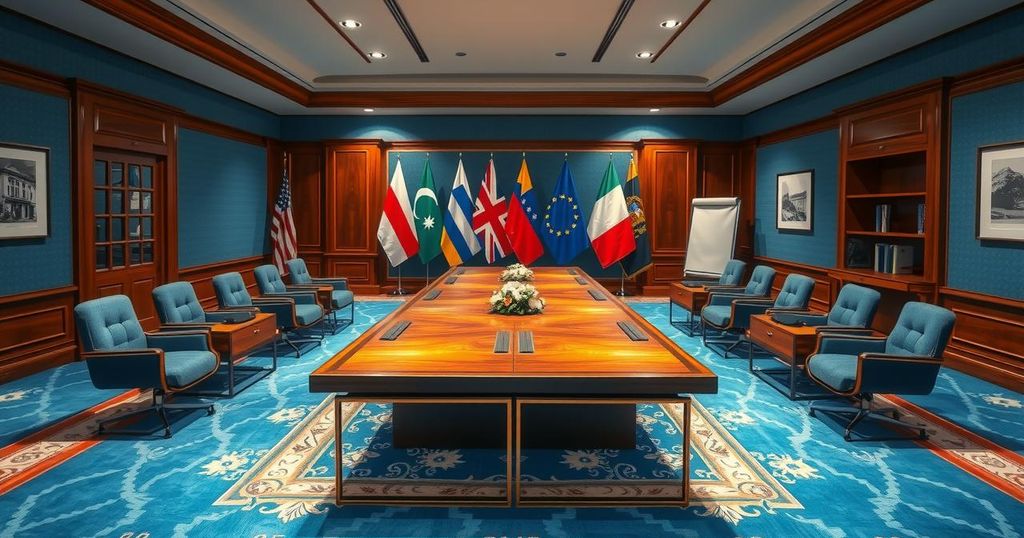Mr. Zane Dangor, South Africa’s G20 Sherpa, presented the priorities of the nation’s G20 Presidency to the UN General Assembly, emphasizing solidarity, equality, and sustainability. He articulated the importance of cooperative governance and reform in the G20’s approach towards addressing global challenges, particularly inequality, climate change, and sustainable development. The agenda includes enhancing disaster resilience, ensuring debt sustainability, and mobilizing resources for just energy transitions. Mr. Dangor reinforced the significance of collaborative international efforts as vital to addressing the pressing global issues facing humanity.
During a recent United Nations General Assembly briefing, Mr. Zane Dangor, the G20 Sherpa and Director-General of the Department of International Relations and Cooperation of South Africa, expressed gratitude for the opportunity to outline the priorities of South Africa’s G20 Presidency—the first of its kind for the African continent. This presidency serves as a platform to advance themes of “Solidarity, Equality, Sustainability” as articulated by former President Nelson Mandela, emphasizing the moral responsibility to advocate for social justice and equity on a global scale.
Mr. Dangor highlighted the importance of cooperation between the G20 and the United Nations in promoting a comprehensive approach to global economic governance, as stated in General Assembly resolution 71/327. This resolution endorses informal engagement between the UN and intergovernmental groupings like the G20, aimed at fostering transparency and coherence in global decision-making processes. He reaffirmed that the General Assembly remains the principal deliberative body in international governance, with G20 activities serving to reinforce UN reform initiatives rather than create parallel processes.
The “Pact of the Future,” established to revitalize global governance, offers a pivotal opportunity for integrating its actions into the G20 agenda. Mr. Dangor commended the ongoing efforts by the President of the General Assembly in addressing the implementation of this pact, underscoring the necessity of collective action in tackling multifaceted global challenges, termed by the UN Secretary-General as a global “polycrises.”
Emphasizing the urgency of addressing inequality and sustainable development, Mr. Dangor noted that the challenges facing humanity—such as poverty, hunger, and climate change—threaten future generations. The G20’s prioritization of solidarity, equality, and sustainability aims to build an inclusive, people-centered future, reflecting the African philosophy of Ubuntu.
South Africa’s G20 agenda outlines several key priorities aimed at fostering growth and addressing structural challenges: enhancing disaster resilience, ensuring debt sustainability for low-income countries, mobilizing finance for a Just Energy Transition, and promoting the responsible harnessing of critical minerals for development. To facilitate these goals, three Task Forces have been established focusing on inclusive economic growth, food security, and innovation in artificial intelligence and data governance.
Notable initiatives include the Broadened Compact with Africa 2.0 and a comprehensive review of the G20’s efforts over the years. Mr. Dangor discussed the importance of reforming the multilateral trading system while championing climate change action, diversity, equity, inclusion, and international tax cooperation. The forthcoming anniversaries of the UN and pivotal documents like the UN Charter present a chance to reflect on achievements and set new goals for global cooperation amidst evolving geopolitical realities.
The inclusion of the African Union in the G20 has been highlighted as a significant step in amplifying Africa’s contributions to global economic governance. South Africa advocates for an inclusive dialogue to address pressing concerns and stresses the importance of international collaboration in achieving lasting peace and security.
In closing, Mr. Dangor recalled Nelson Mandela’s words emphasizing the necessity for humanity to cooperate to improve lives globally. He reiterated the firm commitment of South Africa to advocate for peace, equality, and human dignity, viewing the upcoming G20 Summit in 2025 as an invaluable opportunity for cooperative dialogue and meaningful collaboration among global leaders.
Mr. Dangor expressed appreciation for the assembly’s attention and looked forward to further engagement on these critical issues.
In conclusion, the briefing by Mr. Zane Dangor underscored South Africa’s pivotal role as the first African nation to assume the G20 Presidency. Focusing on solidarity, equality, and sustainability, the presidency aims to address pressing global challenges through collaborative efforts. Mr. Dangor’s emphasis on the interconnectedness of nations and the importance of reform in global governance reflects the broader commitment to fostering a more equitable and sustainable future. The upcoming G20 Summit presents an opportunity for significant advancements in cooperative international dialogue.
Original Source: allafrica.com




